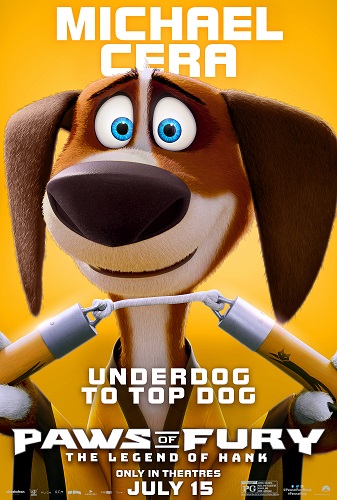Paws of Fury: The Legend of Hank (Koetseir, Minkoff, and Bailey, 2022)
Paws of Fury: The Legend of Hank is an animated movie that kids will love, but also one that adults can enjoy.
Paws of Fury immediately presents itself as a children’s movie. The colors are bright, the kittens are cute, and the main character is a loveable pup. That’s kid enticement 101. The movie also immediately presents tropes that kids can easily identify with: good versus evil and dogs versus cats.
But the movie provides plenty of engagement for adults as well. Ricky Gervais brilliantly portrays the arrogance and emotional indifference adults associate with the feline species as Ika Chu. Gervais really resonates with older audiences by epitomizing the evil inclinations we associate with bad leaders or snarky middle management bosses we’ve had to endure. “I have to do what the Shogun says, but in a way that will benefit ME.” Ika Chu’s blatant lack of integrity is ostensibly funny to the general audience, but is infuriating to any adult that has witnessed or suffered from such abuse of power.
The creators of Paws of Fury judiciously sprinkle these poignant satirical moments of adult humor throughout the film to great effect. The movie deftly addresses mature issues of:
Leadership. The actions of Ika Chu, The Shogun, and Jimbo give the audience an opportunity to parse through what makes a good or bad leader through their leadership styles.
Xenophobia. The contempt that the town of Kakamucho shows for dogs seems to be a criticism of America’s immigration policy towards our neighbors to the south.
Gun Control. “Guns don’t kill cats. Cars and curiosity kill cats.” It’s a familiar phrase that might go over a child’s head, but will absolutely resonate with any American adult. It’s a provocative line that I think avoids controversy but challenges adult viewers of the film to consider their stance on gun control given the current state of affairs in America.
Substance Abuse. This is an aspect of the movie that will certainly go underappreciated because of the delicate nature of the topic, but I think the film does a good job of addressing, Samuel L. Jackson’s character, Jimbo, and his dependence on alcohol to cope with stress without making it an overly depressing aspect of the film.
Slick references to N.W.A. and Samuel L. Jackson’s trademarked expletive are other examples of the film’s strategy to be fun for kids but also engaging for adults. Given the politically polarized time we live in, it may be inevitable that some read a political agenda into the film or complain that such adult references are out of place in a kiddie film.
But that commitment to staying engaged with an adult audience is the film’s best trait, in my opinion, because the film seems to be presenting a challenge to its adult viewers: how do we provide good leadership and quality mentorship to the young people around us? Jimbo surprises as the real hero of the film by being a committed mentor to the main character, Hank, played by Michael Cera. The film seems to suggest that the combination of youthful enthusiasm and qualified experience optimizes the value of both. Jimbo uses his experience and wisdom to harness Hank’s potential and enthusiasm to the benefit of everyone in Kakamucho.
The ending of the film may leave some viewers confounded though. The movie seems to abandon its commitment to making Hank the film’s hero and vests that role in another character. It’s a choice that works for the film but perpetuates the injustice of doling status and honors based on identity rather than achievement.
Ultimately, however, the representation of mentorship elevates the movie and should make it entertaining not just to kids but also to adult viewers willing to check their own assumptions and prejudices and enjoy the tale for what it is.

